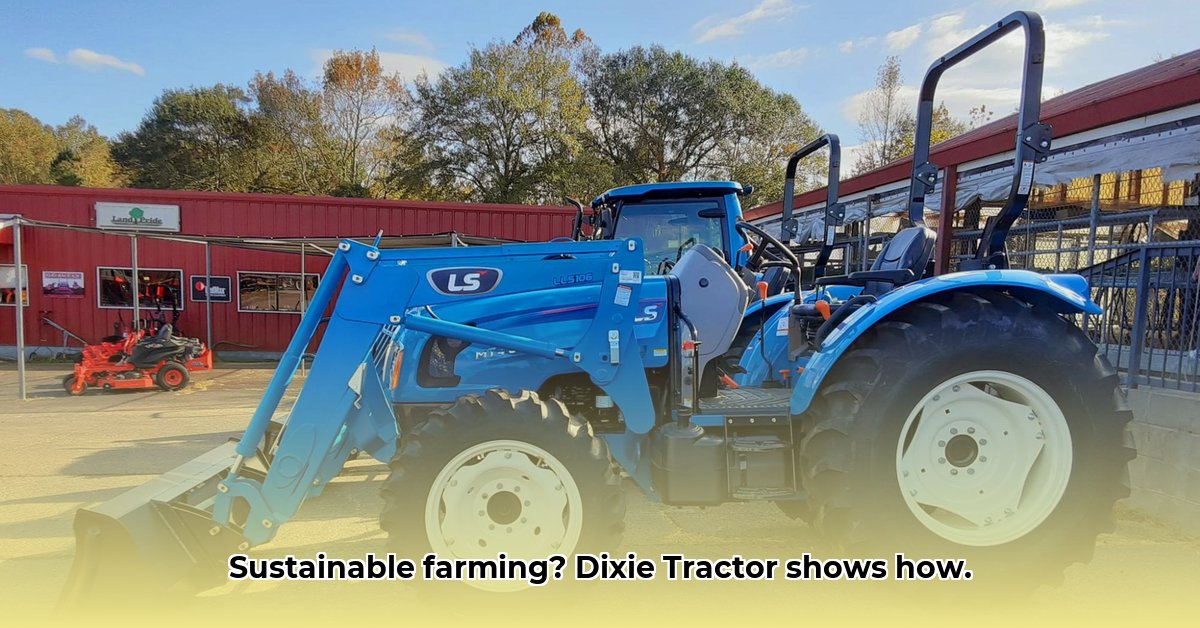
Dixie Tractor's Role in Cullman's Agricultural Landscape: A Case Study
Dixie Tractor, a Kubota dealership in Cullman, Alabama, occupies a pivotal position within the local agricultural community. This case study examines its contributions to sustainable agricultural practices, analyzing both its strengths and areas needing improvement. While Dixie Tractor facilitates sustainable practices indirectly through equipment selection and maintenance services, a transparent, publicly stated commitment to broader sustainability goals remains absent. This lack of explicit commitment raises questions regarding the full extent of its impact. For additional insights into agricultural equipment sales, see this related resource.
Assessing Dixie Tractor's Contribution to Sustainability
To accurately evaluate Dixie Tractor’s role in sustainable agriculture, comprehensive data is crucial. Currently, available information is limited, hindering a thorough assessment. Critical data gaps include:
- Equipment Sales Data: Precise sales figures for specific Kubota models are needed to analyze fuel efficiency and emission levels across the dealership's customer base. This data would allow for a more precise calculation of the overall environmental impact of the equipment utilized by Cullman farmers.
- Farm Profile Data: Information on farm size, crop types, and irrigation methods is essential for contextualizing equipment usage and its resulting environmental impact. This would allow for a better correlation between equipment use and environmental outcomes.
- Repair and Maintenance Practices: Details regarding Dixie Tractor's repair and maintenance processes, including parts recycling programs and end-of-life equipment management, are needed to fully understand its impact on waste reduction. This is crucial for understanding the contribution to minimizing waste in the agricultural sector.
- Regional Environmental Data: Access to regional data on diesel consumption and agricultural greenhouse gas emissions is necessary to provide a broader context for evaluating Dixie Tractor's contribution within the wider Cullman agricultural system. The integration of regional contexts helps establish benchmarks for measuring real progress, not just theoretical goals.
Recommendations for Enhancing Sustainability
To significantly enhance its contribution to sustainable agriculture, Dixie Tractor should implement the following strategies:
Short-Term Actions (0-1 years)
- Conduct a comprehensive environmental impact assessment: This involves thoroughly evaluating its operations, identifying areas for improvement, and establishing baseline metrics for future progress measurement. This assessment provides a data-driven approach to target environmentally significant activities for changes.
- Develop a farmer outreach program: This program should educate farmers on fuel-efficient equipment operation and maintenance practices, directly influencing their environmental impact. Farmers will have the support to implement and improve sustainable practices.
- Explore partnerships with local organizations: Collaboration with local environmental groups, agricultural extension services, and government agencies can provide access to resources and expertise, broadening the impact beyond a single entity. This improves collaboration and access to crucial resources.
Long-Term Actions (3-5 years)
- Publicly release a formal sustainability plan: This plan should include specific, measurable, achievable, relevant, and time-bound (SMART) goals for reducing environmental impact, improving transparency, and building trust with stakeholders. This enhances accountability and attracts further investments in sustainable initiatives.
- Invest in renewable energy infrastructure: Transitioning to renewable energy sources for dealership operations would significantly reduce its carbon footprint. This aligns with broader sustainability initiatives and adds positive long-term incentives.
- Implement a comprehensive parts recycling and equipment disposal program: Developing systematic methods for recycling used parts and responsibly disposing of end-of-life equipment minimizes waste and reduces environmental impact. This strategy will improve environmental performance and reduce waste.
Indirect Contributions to Sustainability
Although Dixie Tractor lacks a formally stated sustainability policy, its operations contribute indirectly to environmental sustainability. The matching of appropriate equipment to customer needs may prevent over-purchasing, reducing unnecessary fuel consumption and GHG emissions. Furthermore, the dealership's commitment to efficient repair and maintenance extends the lifespan of farm equipment, minimizing waste. However, the absence of a formal commitment limits the scope and efficacy of these indirect contributions.
Broader Context and Future Outlook
Dixie Tractor's contribution to sustainability extends beyond its direct operations, affecting the overall environmental footprint of the Cullman agricultural sector. A collaborative approach involving the dealership, farmers, Kubota Corporation, and local government is crucial for driving sustainable agricultural practices. Open communication, data sharing, and policy support can collectively achieve meaningful progress.
Measuring the Environmental Impact of Kubota Tractors: A Multifaceted Approach
Accurately measuring the environmental impact of Kubota tractors requires a holistic approach that considers several key factors beyond simple fuel consumption:
- Fuel efficiency: Measuring fuel usage per unit area cultivated establishes a baseline for comparing different tractor models and farming practices.
- Greenhouse gas emissions (GHGs): Calculating the CO2e (carbon dioxide equivalent) footprint encompasses all GHGs emitted during combustion, considering the specific fuel type.
- Manufacturing impact: Assessing the environmental burden throughout the entire tractor lifecycle – from material sourcing to transportation – provides a comprehensive picture.
- Soil health: Monitoring soil organic carbon content, nutrient levels, and structure reveals the impact of sustainable farming practices enabled by the tractors.
- Water usage: Measuring water consumption in agricultural operations identifies potential for water conservation improvements.
- Waste generation: Analyzing waste generated during maintenance, repair, and disposal highlights opportunities for waste reduction strategies.
- Economic considerations: Assessing the cost-effectiveness of sustainable practices relative to their environmental benefits provides a crucial economic perspective.
Dixie Tractor's operational data, combined with information on local farming practices, could provide crucial insights into the environmental impact of Kubota tractors within the Cullman region. However, data collection challenges remain, necessitating collaboration among farmers, dealers, and researchers to establish consistent methodologies. Overcoming these challenges offers significant opportunities for developing more sustainable agricultural technologies and informing policy decisions.